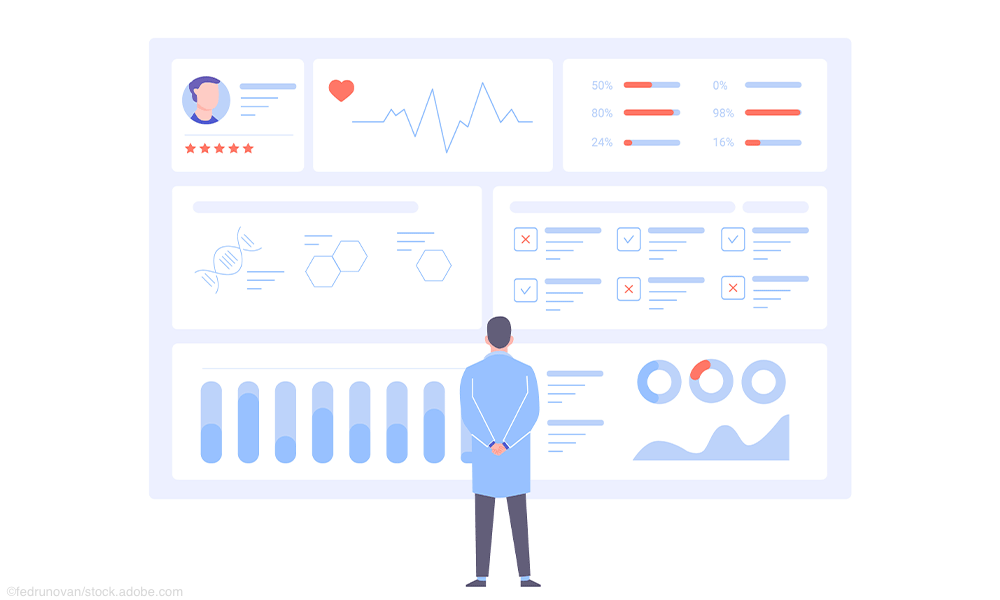- Industry News
- Law & Malpractice
- Coding & Documentation
- Practice Management
- Finance
- Technology
- Patient Engagement & Communications
- Billing & Collections
- Staffing & Salary
Poor EHR tech impacts staff members differently by role
Can the next generation of EHRs solve the problems of the current generation?
© fedrunovan - stock.adobe.com

Everyone involved in health care knows that electronic health records create problems for efficient care delivery. According to a recent HIMSS survey, nine out of 10 respondents said that EHRs played a role in physician and nurse burnout, with 40% saying the EHR used at their facility was the major or primary cause. But what’s less widely understood is how EHRs hamper health care professionals differently depending on the role they play in the organization.
Some of the problems of legacy EHRs – such as information overload, excessive data entry, note bloat, an inability to navigate the system quickly, and a fear of missing vital information – impact all health care professionals. But many are role-specific. The senior executive, the informatics support team member, and the nurse may all be frustrated with the EHR, but in ways that hurt care delivery differently.
The ability to personalize the EHR means that it can be tailored for the specific and varying work processes within health care organizations. Legacy EHRs were developed from billing systems, rather than being designed for the delivery of care. They can’t be personalized to meet the varying needs of local caregivers. Next-generation EHRs use a low-code/no-code design that allows for precise on-site tailoring to health care work processes.
Understanding the ways EHR pain points vary by role can help clarify how new EHR technology can unlock, rather than hamper, health care efficiency and care quality. Overcoming these pain points means that technology can do for health care what is has done in other industries – drive down cost, increase flexibility, and empower customization.
The EHR pain varies by role
A health care executive spends a lot of time thinking about compliance reporting. It might be legal compliance, Joint Commission dictates, or requirements of the specific organization. All of this would be far easier to do if legacy EHRs hadn’t originally been designed with only one thing in mind – billing.
For the executive, there is also pain caused by the expense of legacy EHRs, and the huge costs of switching. Some of that is retraining, some is the eye-opening upfront costs, and some are additional IT needs. I know of one hospital that chose a well-known EHR provider and was forced to double the size of its IT team – another 105 hires! And the huge costs of legacy EHRs mean there is often little money left to make other facility improvements.
On the front lines of care, it’s well established that the inefficiencies of legacy EHRs are leading to nurse burnout. Current systems are often a mishmash of work processes that require nurses to spend more time switching screens and filling out forms than caring for patients.
For doctors, the lack of mobile solutions is a pain point associated with legacy EHRs. They want to be able to review information on the move, potentially checking vitals and lab results on a mobile device immediately prior to seeing the patient.
Next-generation EHRs are giving nurses and doctors the ability to personalize their various workflows in a single screen, much like you might personalize your web browser. Shortcuts can be set up to access important charts that require frequent review, and push notifications set up to ease the administrative burden and free up more time for actual care.
For the IT/Infomatics team, the inefficiencies of legacy EHRs often force the hiring of additional staff, as in the example above. They don’t offer interfaces into other related functions of the organization that can impact the EHR, such as building management and critical utilities. This spreads IT staff thin as they chase down fires to put out every day.
With next-generation technology, IT staff can do more, bringing systems together on a dashboard to diagnose problems immediately and respond faster when problems threaten care delivery. The integration of systems means that IT doesn’t focus on “keeping the lights on” so much but has more time to optimize the performance of other business units inside the organization.
Of course, legacy EHRs hurt patients as well. They make SAFER guidelines harder to follow, increasing the possibility of medication or procedure errors. By taking caregiver time away from care, they increase the likelihood of patient dissatisfaction and negative reviews of the facility. And since they were not designed with health care work processes in mind, they can’t efficiently support functions such as intake and discharge, leading to patient frustration and lost revenue for the facility.
Simply put, technology should be a servant to the mission, not the master. Yet too often health care professionals at all levels – executive, medical, and IT – conform their time and processes to the dictates of an inflexible and inefficient EHR.
This is why for the most part, health care has been held back by technology, rather than been transformed by it. Next-generation EHRs offer the chance to introduce truly disruptive technology that is designed by caregivers and allows technology to overcome inefficiencies through flexibility and personalization. Once the health care industry fully takes advantage of that opportunity, it will be a new day for every provider, every organization, and every patient.
Eddie J. Brito is director, Project Portfolio Management Office, for Juno Health. Brito has over 25 years’ experience in leadership and management with specialization in program/portfolio management. He is an advocate for EHR transformations and has sat on several boards promoting changes to the market, such as OSEHRA.
